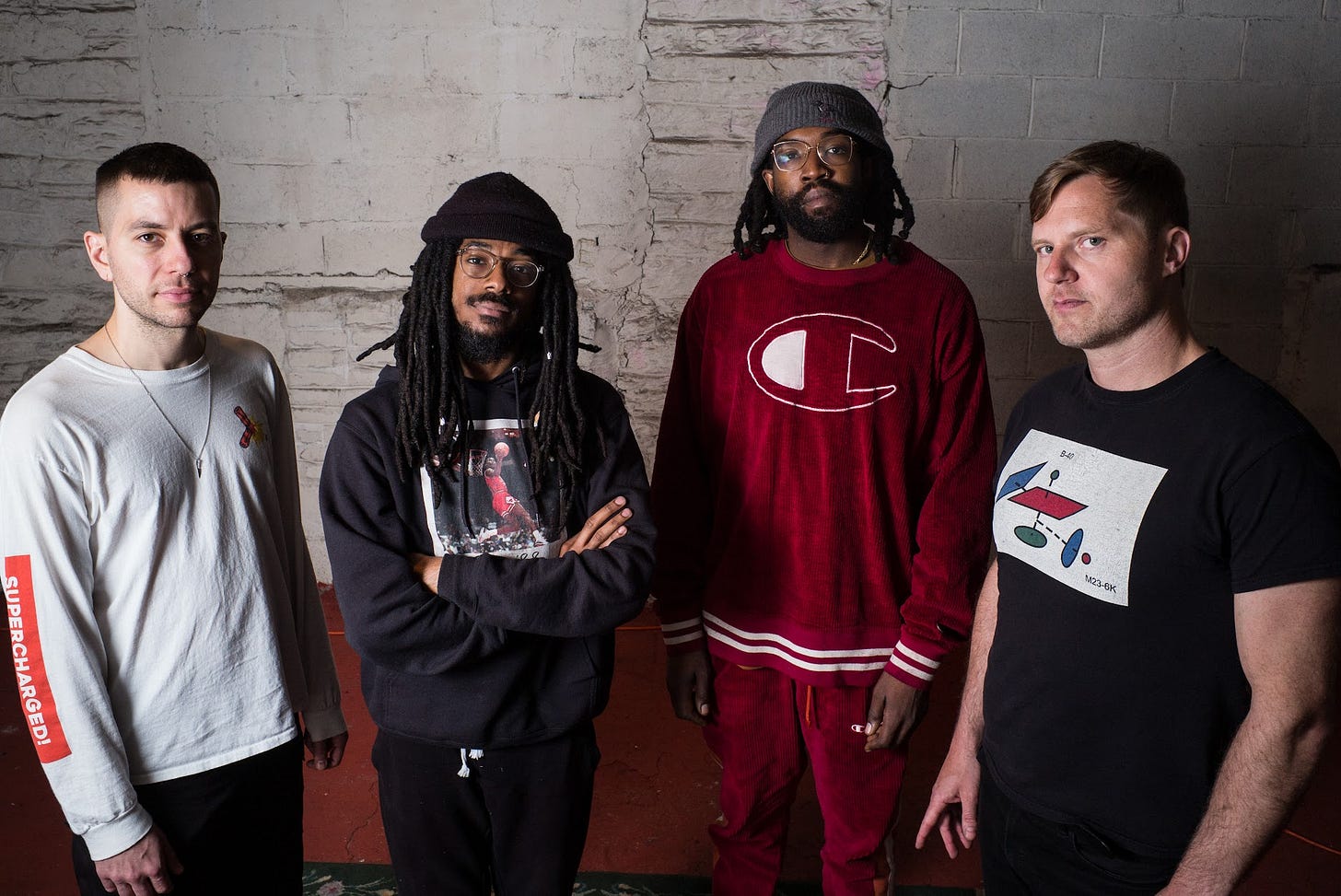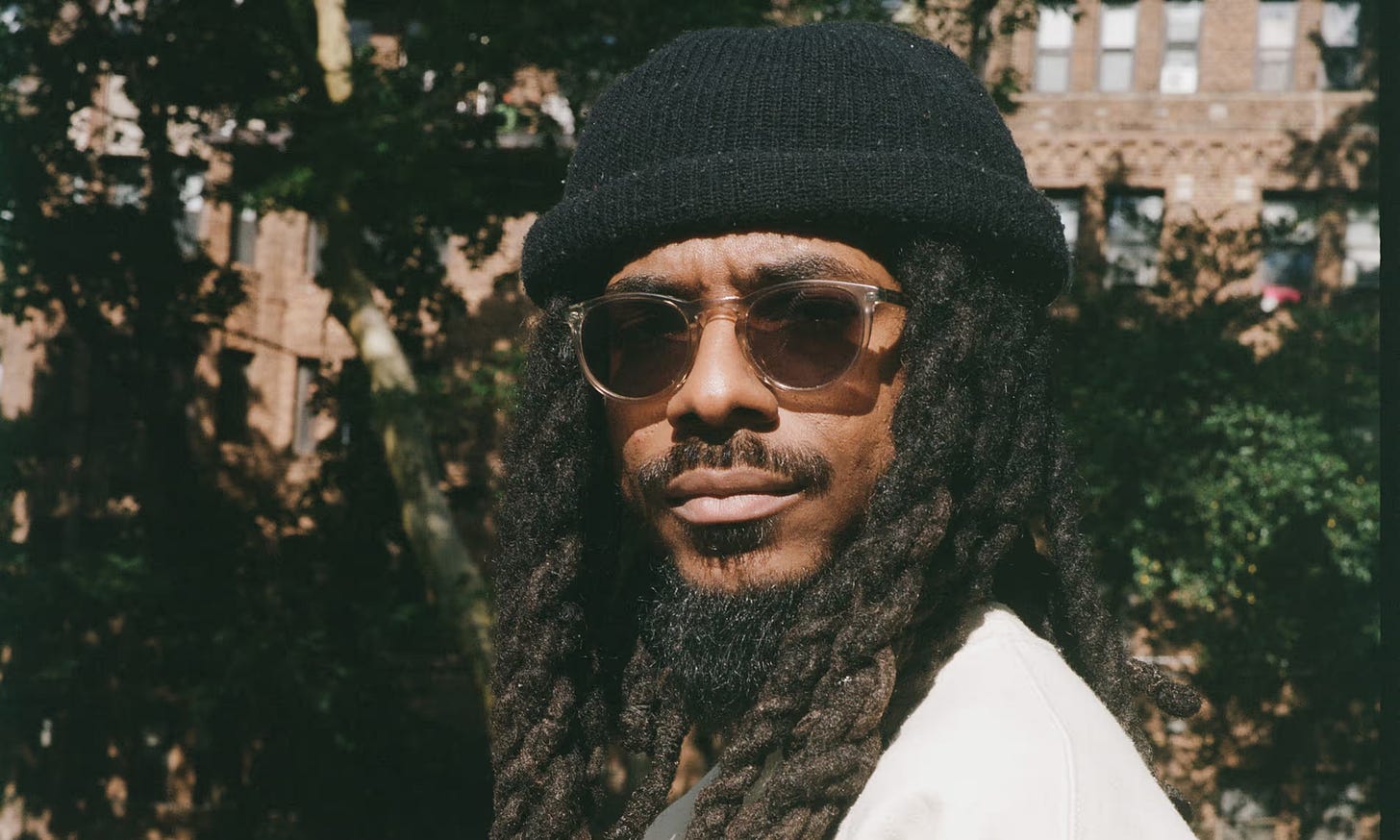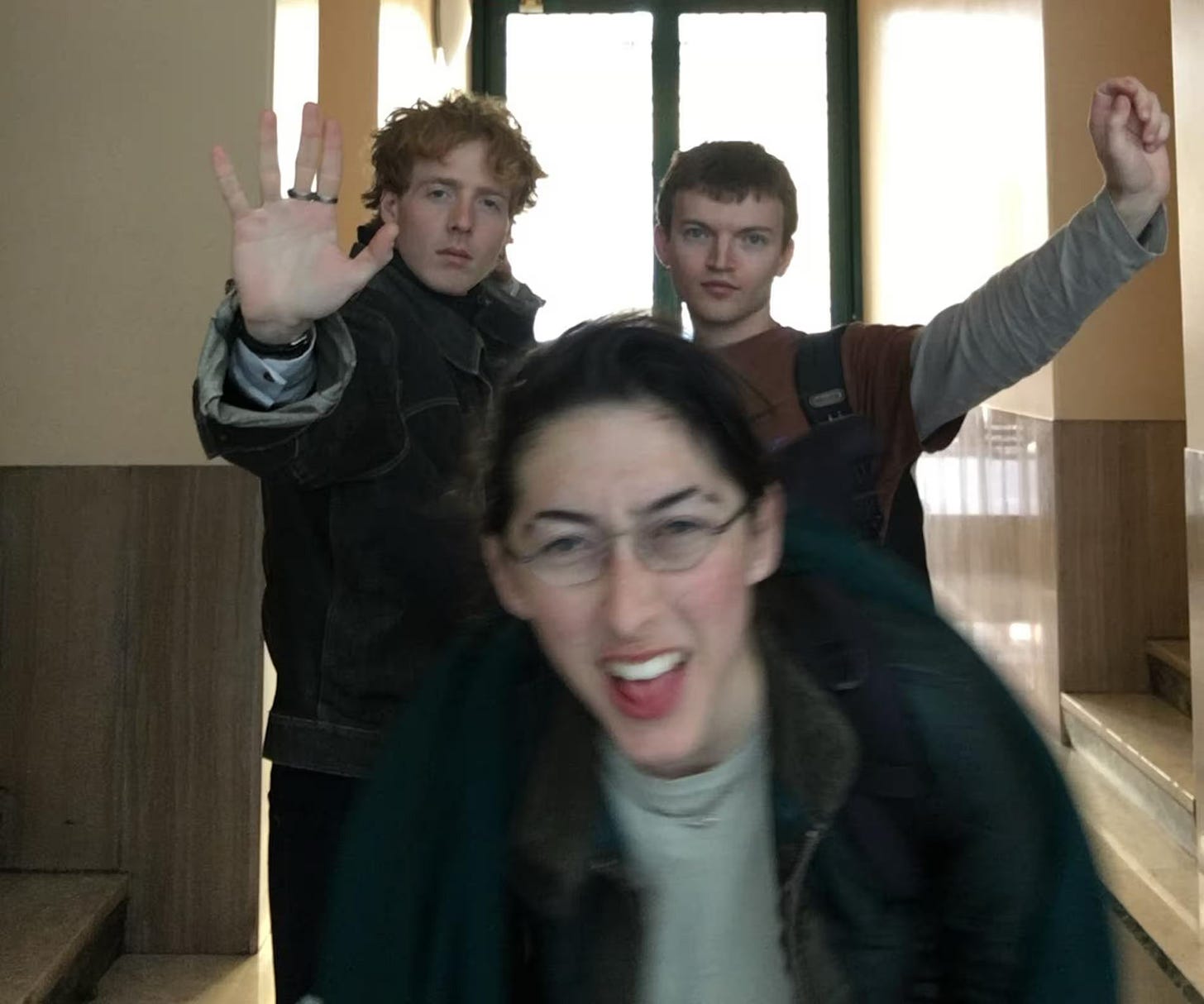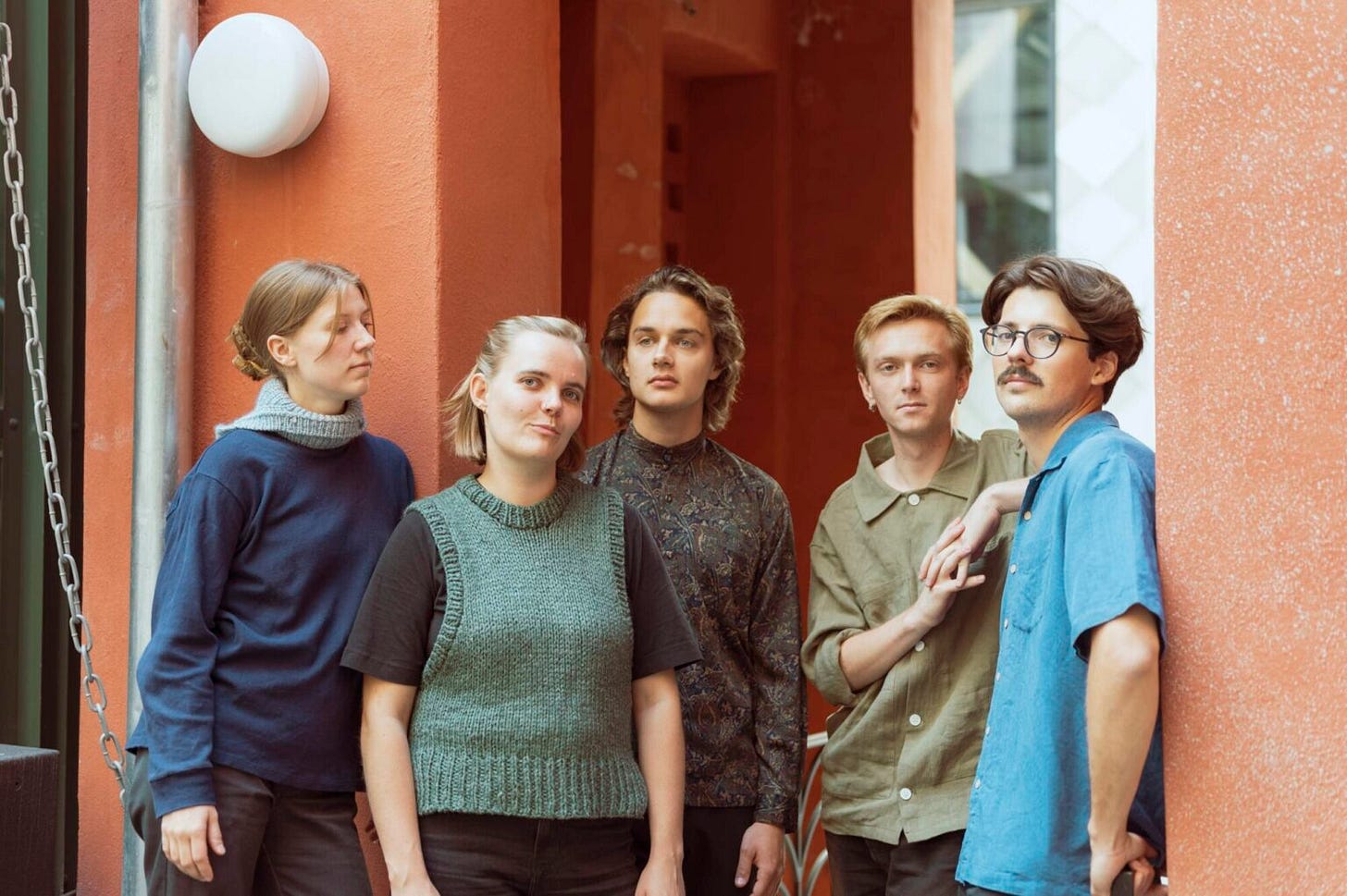Sometimes it Snows in April
Peter Evans, Joel Ross, Still House Plants, the Necks, Amalie Dahl's Dafnie, Moreno Veloso
For Peter Evans Less is Still More
I don’t know of any trumpeters who can match the sheer technical virtuosity, unflagging vitality, and relentless drive of Peter Evans, who has been blowing minds since dropping his staggering solo album More is More on Evan Parker’s psi label back in 2006. In the years since we’ve grown accustomed to his astonishing abilities. In fact, Evans seems accustomed to it as well, as no matter how technically daunting or difficult what he tackles may be, it always seems effortless. His energy is bottomless, and he canmake the most demanding, vibe-shifting performances seem like a walk in the park. At times his nonchalant brilliance can feel macho—he can play something that bring most trumpeters to their knees, and act as if he’s just snapped a finger. It all seems easy for him, and I don’t think I’ve ever since him appear winded or challenged by anything he plays. I imagine it’s some cross of rigorous training and innate musculature that renders the most physically taxing passages a piece of cake.

It could be that ease that has propelled him toward greater challenges, both within and beyond improvised music. His accounts of works by the composer Lucia Dlugoszewski on last year’s superb Abyss and Caress (Col Legno), a double CD by Klangforum Wien, are no less staggering than his mind-melting solo recordings. But sometimes the acrobatic nature of his playing can be so relentless that the music threatens to become exhausting. I’m happy that he’s been ameliorating that tendency in recent years, and one of the most fruitful avenues for his current work is the quartet Being and Becoming, which rolls into Berlin for KM28 performances on Tuesday and Wednesday, April 23 and 24. The group’s eponymous 2020 debut was a knockout, but the more recent Ars Memoria is even better, with the trumpeter exploring a much different side where sustained sound trumps the usual hyperactive intensity. Originally the group included the fantastic Savannah Harris on drums, but the second album is with Michael Shekwoaga Ode—who’s gained attention through his work with Chicago saxophonist Isaiah Collier. He’s one of the loudest, most relentless drummers I’ve ever heard, and I feared he might incite those same qualities in the trumpet player.
But I was wrong. In fact, Ars Memoria contains some of the most stripped-down, contemplative music Evans has ever made. Once again the group includes bassist Nick Jozwiak and the vibist Joel Ross—the Chicago native who’s part of a new generation of jazz improvises rooted in gospel tradition—and they go all in with Evans. While the high-flying opening track “The Cell” sounds like an especially dynamic slice of modal post-bop, with the bassist holding down a muscular, chordal ostinato, Ross offering spacious commentary, and Ode pushing and pulling the groove behind the leader’s measured solo, which unfolds over the entirety of the tune’s 12-minute duration. The energy picks up, with Ross and Ode becoming more active, but Evans fills most of the space without breaking a sweat. It’s great, but the pieces that follow have really knocked me out. “Nowhere” embraces a more minimalist conception, with Evans blowing tart unpitched breaths over a repetitive Ross patterns that actually ripples with slight variations in the way that Morton Feldman drew inspiration from the idiosycracies in Persian carpets. The piece is constantly changing across its 19 minutes, but often those shifts are wonderfully gradual and fluid, and if one fully surrenders to the music the band has already moved into a new realm before we notice the change. I hesitate to lable Evans’ playing here minimalist, but it is decidedly more restrained than usual, a highly effective change that defines the character of the performance. It’s no less impressive than the dizzying heights of his earliest solo work, but it proves that Evans can use more modest materials to deliver the same sort of gut punch, especially when he uses circular breathing to unspool a striated carpet of sustained sound. Ode and Jozwiak are no less resourceful and inspiring in their choices. Check it out below.
While the album’s title track—recorded live nearly a year after the studio session—reverts back to a more extroverted, busy mode, the album’s other pieces offer different spins on the same minimalist aesthetic. “Salah” is a meditation marked by vibrato-rich bowing beneath the trumpeter’s reverberant long tones, while “Opus 5” is built around insane brushwork by Ode, a kind of static patter that changes the timbre dramatically without disturbing the contemplative zone, that is until the final minute when all hell breaks loose. I regret not giving this album more than a single spin last year, but thankfully it still sound great in 2024.
Other Sides of Joel Ross
Ross released his fourth album as a leader for Blue Note back in February with nublues, another deceptively meditative gem marked by subtly rich textures, elevated group interaction, and probing improvisation. The band includes the excellent alto saxophonist Immanuel Wilkins, who also situates his soulful brand of post-bop within the harmonies of Black gospel music, and while the tunes—a mix of originals and standards by John Coltrane and Thelonious Monk—might feel a bit too chill on first glimpse, reaching toward a kind of slow jam lethargy, the opposite is true. Beneath the glossy tones and warm timbre is a genuine heat, starting from the metallic edge Ross brings to his enveloping attack. The group—which also includes pianist Jeremy Corren, bassist Kanoa Mendenhall, and drummer Jeremy Dutton—tackles Coltrane’s “Equinox” with a measured grace that might seem a bit restrained at first, but that smoothness hides a quicksilver interactivity and initially mutes the string of bracing solos that fill that performance, ending with the way the leader piles up vibrato-rich notes as the piece reaches its criss-crossing denouement.
A number of tunes are enhanced by the presence of flutist Gabrielle Garo, including a brief duo piece, with Ross on piano, called “Chant” where her overdubbed blend of her flutes evoke the sound of a Mellotron. Elsewhere she provides a nice soloistic foil to Wilkins, who is excellent throughout. “Bach (God the Father in Eternity)” interpolates a Bach fragment within a gospel ballad framework, but beneath that potentially cloying conceit the group’s internal rapport and multi-linear improvising dazzles. The title track opens more than two-and-a-half minutes of solo Ross, where his command of the vibrato cuts like a knife, simultaneously warm and jagged. The rhythm section enters quietly, as if they don't want to interfere with the leader’s improvisation, slipping in behind him and slowly raising the temperature of Wilkins’ sneaky entry. Like most of the album its exterior placidity belies the fire generated by the group beneath the surface.
Getting my Head Around Still House Plants
I’ve been keeping tabs on the British trio Still House Plants ever since Café Oto programmer Fielding Hope waxed poetic about them the first time I met him four or five years ago. I chalked some of his enthusiasm up to Scottish pride, as I initially felt the group’s embrace of Chicago post-rock verities hit a little too close for my own comfort. It was clear from the start that Jess Hickie-Kallenbach had a super unusual, compelling voice, but paired with the halting attack of guitarist Finlay Clark and drummer David Kennedy I had trouble getting my head around it. With the group’s recently released third album If I don’t make it, I love u (Bison) I’ve definitely started to come around. It’s burrowing into my brain more with every listen, but the trio have such a strange sensibility that I’ve had to alter my own expectations. Hickie-Kallenbach sings weirdly rhapsodic melodies that almost seem purloined from 90s slow jams, but her melismatic delivery is unconventional. She doesn’t just add elaborate curlicues and swooping flourishes at the end of a phrase. Her entire performance feels like a complex melodic elaboration, as if she inhabits a specific phrase or melodic fragment and transforms it into a kind of chant, exploring the line from every conceivable angle.
Kennedy and Clark still embrace a kind of jarring attack, but it’s so intimately connected to the idiosyncratic phrasing of Hickie-Kallenbach that it seems utterly fluid. She’s singing words, but her voice functions much more like another instrument than a narrative source. Still House Plants have honed a strange practice that I’m still trying to parse—a recent Wire cover story indicated its largely instinctual essence, but I think my technical understanding of how they operate remains fuzzy. Luckily, the music is connecting with me in a big way now, and I'm sure my grip on how it works will follow. I feel a bit hesitant to write about something that I’m still in the process of figuring out, but the trio is playing in Berlin at 90mil on Tuesday, April 23, so this is where I stand at the moment. Below you can check out one of my favorites from the new record, “Silver grit passes thru my teeth.”
Short Takes on This Week’s Live Action
The Necks are Back
Another album I regret not spending more time with last year was Travel (Northern Spy), the 19th studio album from the sui generis Australian trio the Necks. Over its long history the group—keyboardist Chris Abrahams, bassist Lloyd Swanton, and drummer Tony Buck—hasn’t appreciably altered its basic modus operandi, with one of the members typically initiating a performance or piece with a single pattern or riff with the rest of the group following, exploring, stretching and morphing from the smallest gesture into excursions that are utterly captivating in their melodic grandeur and rhythmic hypnosis. On the other hand, Travel reflects a rather radical change in the trio’s working methods, presenting four extended pieces rather than the usual hour-long excursions that have been at the center of its galvanizing live shows. While their methods are often similar, the results usually take the listener to new places. “Signal,” the 21-minute gem that opens the album with a woody, driving ostinato by Swanton, has proven impossible to resist from my very first encounter. Abrahams takes the spotlight, discovering endless wrinkles within an elegant piano arpeggio, occasionally complemented with some adroit organ counterpoint. It captures the Necks at their best, casting a spell with sounds that feel like they’re floating in space, but which are actually quite driving and active. You can hear it below. The group is performing in Berlin for the first time in six years on Tuesday, April 23 at Heimathafen Neukölln.
Amalie Dahl’s Dafnie
Back in January I wrote about the excellent Oslo-based Danish saxophonist Amalie Dahl who was then in town with a nimble trio called Treen. As I noted at the time, I first heard Dahl’s playing via her quintet Dafnie, which cleaves to a more traditional conception of jazz, even if the opening track on the group’s debut was steeped in old free jazz. A couple of weeks ago the group released its follow-up Står op Med Solen (Sonic Transmissions/Aguirre), which captures a far more assured bandleader with a band that has clearly found its groove collectively. Bassist Nicolas Leirtø and drummer Veslemøy Narvesen carve out deep grooves for the protean frontline of Dahl’s alto saxophone, Oscar Andreas Haug’s trumpeter, and Jørgen Bjelkerud’s trombone, which deliver the leader’s beautiful arrangements with full-bodied splendor and elastic range.
The title piece arrives in three parts spread across the album, with nuanced textural statements unfolding over beautifully structured, through-composed sequences that capture a side of the band somewhat removed from its rigorous post-bop underpinning. More gripping is the blues-stoked “Eco-echoes,” in which the horns articulate a movingly elegiac melody. But the tune’s centerpiece is Leirtø’s bass solo, which uses familiar materials to forge the kind of galvanizing statement that can turn a performance on its head. You can listen to it below. There’s a cool stuttering quality to the arrangement on the zig-zagging “Algorythm” and the way the brass’s impressive backgrounds open up for Dahl’s slashing, screaming solo. You can hear it below. I’m sad that I’ll be out of town for the band’s show this Thursday, April 24 at Sowieso, because the new album suggests they’ve dramatically evolved into a real juggernaut.
Veloso & Gil, the Next Generation
There are few voices I find more beautiful and moving than the one possessed by Moreno Veloso, the son of Tropicalia progenitor Caetano. Considering his talents it’s a crime that he’s only made three albums over his career, but each of those reveals the exquisite tenderness of singing regardless of context. I first heard him more than two decades ago, when his album Music Typewriter introduced him and his close colleagues Domenico Lancellotti and Kassin, who together formed three different iterations of what became known as the +2’s. Each musician made a record of original tunes, with the other two serving as the backing band. But Veloso’s most recent album Every Single Night features just his voice and an acoustic guitar—I wrote about the album, which is part of the Black Cross Solo Sessions of pandemic-era recordings from the Corbett vs. Dempsey label, in the context of the +2s last year. The album featured a selection of tunes, most from Brazil, along with a folk gem by Agustin Lara and a version of the Disney ballad “Someday My Prince Will Come,” made famous by Miles Davis. The songs formed a repertoire of music Veloso played for his children before bedtime. Moreno is playing in Berlin on Sunday, April 28 at Gretchen as part of a tour with Bem Gil, the son of another Tropicalia legend, Gilberto Gil. Until seeing this tour date I had never heard of Gil, but from the video clips I’ve seen of their shows together he’s more than up to the task. The concerts feature the two musicians alternating songs, while providing spare instrumental support to one another. Still, I can’t lie: I’m going mostly to revel in Moreno’s gorgeous voice. Check out his version of the stunning Nelson Angelo ballad “Fazenda.”
Recommended Shows in Berlin This Week
April 23: Peter Evans’ Being & Becoming (Peter Evans, trumpet, Joel Ross, vibraphone, Nick Jozwiak, double bass, and Michael Ode, drums), 8:30 PM, KM28, Karl Marx Straße 28, 12043 Berlin
April 23: Jolie Holland; Mark McKowski, 8 PM, Schokoladen, Ackerstraße 169, 10115 Berlin
April 23: The Necks, Heimathafen Neukölln, Karl Marx Straße 141, 12043 Berlin
April 23: Still House Plants; Adrián de Alfonso, 7 PM, 90mil, Holzmarktstraße 19-23, 10243 Berlin
April 24: Peter Evans’ Being & Becoming (Peter Evans, trumpet, Joel Ross, vibraphone, Nick Jozwiak, double bass, and Michael Ode, drums), 8:30 PM, KM28, Karl Marx Straße 28, 12043 Berlin
April 24: Mike Reed, drums, Axel Dörner, trumpet, Joel Grip, double bass, and Håvard Wiik, piano, 8:30 PM, Sowieso, Weisestraße 24, 12049 Berlin
April 24: Andrea Ermke; Xavier Lopez; DJ Peter Cusack, 8 PM, Petersburg Art Space, Kaiserin-Augusta-Allee 101, 10553 Berlin, entrance in the courtyard, Aufgang II, 1 OG
April 24: Tamara Stefanovich (C.P.E. Bach, Scarlatti, Soler, Eisler, Bartók, Ives), 7:30 PM, Pierre Boulez Saal, Französische Straße 33d, 10117 Berlin
April 25: Amalie Dahl’s Dafnie (Amalie Dahl, alto saxophone, Oscar Andreas Haug, trumpet, Jørgen Bjelkerud, trombone, Nicolas Leirtrø, double bass, and Veslemøy Narvesen, drums, 8:30 PM, Sowieso, Weisestraße 24, 12049 Berlin
April 26: Martina Bertoni; Anna Clementi & Thomas Stern play Phill Niblock, 9 PM, West Germany, Skalitzer Straße 133, 10999 Berlin
April 26: Aki Takase, piano; Daniel Erdmann, saxophone, and DJ Illvibe, turntables, 8:30 PM, Sowieso, Weisestraße 24, 12049 Berlin
April 27: Larry Goldings, Hammond B3 organ, Peter Bernstein, guitar, and Bill Stewart, drums, 6:30 PM, Zig-Zag Jazz Club, Hauptstraße 89, 12159 Berlin
April 27: Luís Vicente Quartet (Luís Vicente, trumpet, John Dikeman, tenor saxophone, Nick Dunston, double bass, and Lukas Koenig, drums), 8:30 PM, Sowieso, Weisestraße 24, 12049 Berlin
April 27: Mayssa Jallad; Ronja, 8 PM, Silent Green, Kuppelhalle, Gerichtstraße 35, 13347 Berlin
April 27: Elias Stemeseder (piano, harpsichord, synthesizers), Camilo Ángeles (flute, electronics), and Christian Lillinger (drums, electronics), 8:30 PM, KM28, Karl Marx Straße 28, 12043 Berlin
April 28: Moreno Veloso and Bem Gil, 9 PM, Gretchen, Obentrautstr. 19-21, 10963 Berlin






